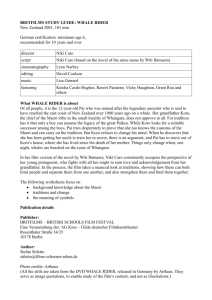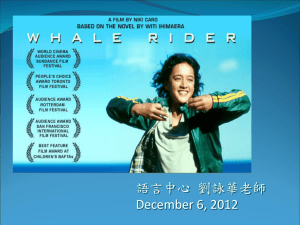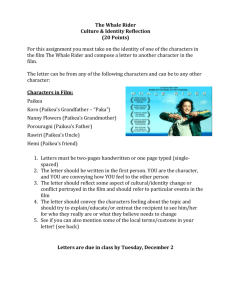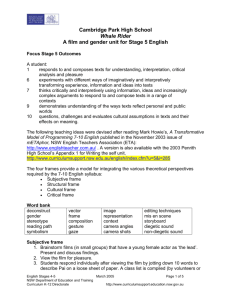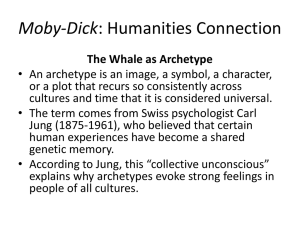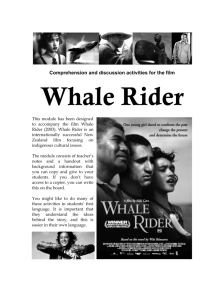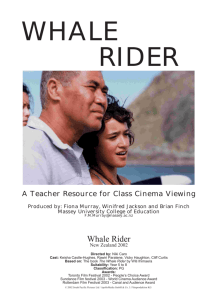Whale Rider study guide
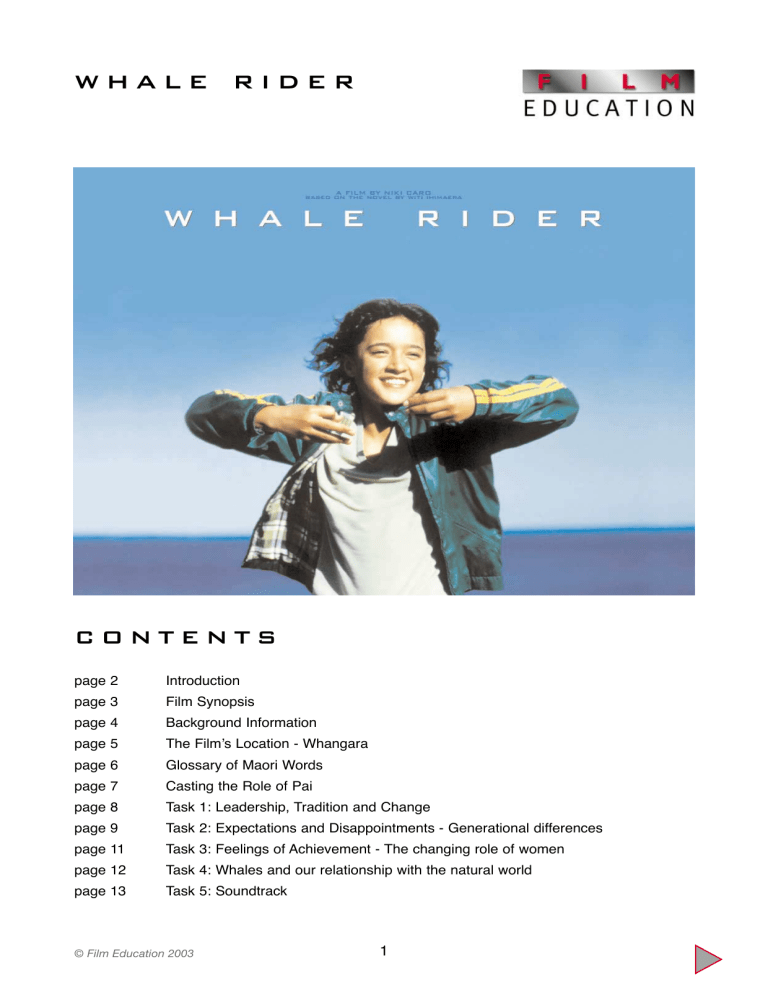
W H A L E R I D E R
C O N T E N T S
The Film’s Location - Whangara
Task 1: Leadership, Tradition and Change
Task 2: Expectations and Disappointments - Generational differences
Task 3: Feelings of Achievement - The changing role of women
Task 4: Whales and our relationship with the natural world
© Film Education 2003
1
W H A L E R I D E R
I N T R O D U C T I O N
This digital CD-ROM study guide considers and tracks the themes of the film: leadership, expectations and disappointments, working together, feelings of achievement and overcoming prejudice. The tasks focus on how the medium of film can deepen students' understanding of the themes and characters.
The film is set in Whangara, which is located on the east coast of New Zealand. It is present day.
The main characters are:
Paikea (or Pai) - a young girl and the central character in the film
● Koro - Paikea's grandfather
● Nanny Flowers - Paikea's grandmother
● Porourangi - Pai's father
● Rawiri - Pai's uncle
The narrative focus stays with Paikea and Koro throughout the film.
Koro
© Film Education 2003
2
Paikea
W H A L E R I D E R
F I L M S Y N O P S I S
In a small New Zealand coastal village, Maori claim descent from Paikea, the Whale Rider. In every generation for more than one thousand years, a male heir born to the Chief succeeds to the title.
The time is now. The Chief's eldest son, Porourangi, fathers twins - a boy and a girl, but the boy and his mother die in childbirth. The surviving girl is called Pai.
Grief-stricken, Porourangi leaves Pai to be raised by her grandparents. Koro, her grandfather who is the Chief, refuses to acknowledge Pai as the inheritor of the tradition and claims she is of no use to him. But her grandmother, Flowers, sees more than a broken line, she sees a child in desperate need of love.
Koro learns to love Pai and when Porourangi, now a celebrated international artist, returns home after twelve years, Koro hopes everything will be resolved and that Porourangi will accept destiny and become his successor.
However, Porourangi has no intention of becoming Chief as he has moved away from his people, both physically and emotionally. After a bitter argument with Koro, Porourangi decides to leave suggesting to Pai that she go with him. She begins the journey but quickly returns, claiming her grandfather Koro needs her.
Koro is blinded by prejudice and even Flowers cannot convince him that Pai is the natural heir. The old Chief is convinced that the tribe's misfortunes began at Pai's birth and calls for his people to bring their twelve-year-old boys to him for training. He is certain that through a gruelling process of teaching the ancient chants, tribal lore and warrior techniques, the future leader of their tribe will be revealed to him.
Meanwhile, deep within the ocean, a massive school of whales is responding to Pai's calls.
When the whales become stranded on the beach, Koro is sure this signals an apocalyptic end to his tribe until one person prepares to make the ultimate sacrifice to save the people - the
Whale Rider.
© Film Education 2003
3
W H A L E R I D E R
B A C K G R O U N D I N F O R M A T I O N
A U T H O R O F T H E N O V E L T H E W H A L E R I D E R -
W I T I I H I M A E R A
The film is based on the book The Whale Rider by Witi Ihimaera. Ihimaera was inspired to write the book in 1985 while living in an apartment in New York overlooking the Hudson River.
'I heard helicopters whirling around and the ships in the river using all their sirens - a whale had come up the Hudson River and was spouting,' Ihimaera recalls.
'It made me think of my home town, Whangara and the whale mythology of that area.'
Ihimaera had taken his daughters to a number of action movies. They asked him why in all of those movies the boy was the hero and the girl was always the one who was helpless. 'So I decided to write a novel in which the girl is the hero and I finished The Whale Rider in three weeks.'
Ihimaera is happy with Niki Caro's (screenwriter/director) adaptation of his novel:
'Niki created a marvellous transformation and she updated the story so that it is very relevant beyond the year 2003. It's not just about a community that is faced with a particular problem of ancestry and succession, it's also about women and how they need to find and make their own way in society. Pai has become this iconic young girl who is desperately trying to seek her own sovereignty and her own destiny in a male-orientated world.'
To find out more about Witi Ihimaera visit www.bookcouncil.org.nz/writers/ihimaerawiti.htm
© Film Education 2003
4
W H A L E R I D E R
T H E F I L M ’ S L O C A T I O N -
W H A N G A R A
When talking about choosing the location to shoot Whale Rider, the film's producer, John Barnett says:
'The novel was set in Whangara and it would almost have been heresy to shoot anywhere else.
There are physical things that are described in the book - the sweep of the bay, the island that looks like a whale, the meeting houses, and of course, the people whose legend we were telling. If we'd gone somewhere else and tried to manufacture the surroundings and the ambience, then I think it would have been noticeable in the picture.'
Many of the film's background cast and extras are locals who are familiar with the Paikea legend from a first-hand perspective.
To see where Whangara is located and to find out more about New Zealand, go to www.newzealand.com
and click on the Whale Rider link (or type Whale Rider into the search field).
© Film Education 2003
5
W H A L E R I D E R
G L O S S A R Y O F M A O R I W O R D S
U S E D I N T H E F I L M
Te Reo
Kaumatua
Rangatira
Wharenui
Tikanga
Maori language
Elder
Chief
Meeting house
Customs
Whakapapa
Tapu
Waka
Haka
Genealogy
Sacred
Canoe
Dance
Karanga
Karakia
Taiaha
Mau rakau
Call
Prayer
Fighting stick
Stick fighting
Moko/Mokopuna Grandchild
Marae Meeting place
© Film Education 2003
6
W H A L E R I D E R
C A S T I N G T H E R O L E O F P A I
The film's director, Niki Caro, was also the scriptwriter for the film.
'I approached the adaptation from the point of view of somebody who was once a twelve-year-old girl,' Caro explains.
'I asked a lot of questions of the story culturally and was very, very open to not imposing my will on it. I felt I needed to serve the story and that's been my ethic throughout the film-making process.’
Casting the role of Pai was an enormous task. 'I didn't want a child actor, I wanted a real child,' recalls Caro. 'I knew I wasn't looking not for 'a' girl that could do it, I was looking for 'the' girl. She didn't have to look a certain way, she didn't have to be a certain age…but we were looking for a special child.' Niki Caro - screenwriter/director
The casting director for the film, Diana Rowan saw ten thousand children from numerous schools before narrowing it down to twelve. 'We then brought them into a workshop situation,' says Caro.
'Keisha Castle-Hughes just shone. She's an astonishing actor. She's the heart of our film and she's a gift.'
Despite no previous acting experience, Keisha was chosen from thousands of girls and had always dreamt of becoming an actor.
Eleven-years-old at the time of filming, Keisha had assistance from Niki Carol and her tutor
Stephanie Wilkin.
Keisha Castle-Hughes - Paikea
'Stef and Niki showed me how to find my feelings and how to talk properly. Then after a couple of weeks I just fell into the character. I didn't need to look back on anything because I could feel the character so much.'
© Film Education 2003
7
W H A L E R I D E R
T A S K 1
L E A D E R S H I P - T R A D I T I O N A N D C H A N G E
(Citizenship, Literacy, Geography)
Read the following quote and then consider the following discussion points about leadership.
'I needed to understand what leadership is, and as the leader of this film, as the director, I understand that leadership is not about shouting and screaming. It's about being the person that serves the rest and creates an environment in which people feel encouraged to do their best work.'
Niki Caro, director of the film Whale Rider
D I S C U S S I O N P O I N T S :
1 What does Niki Caro mean when she says that leadership is about serving others?
2 Pai's grandmother, Nanny Flowers says of Koro, 'He has a lot of rules he has to live by.' Pai says later... 'He is the boss.'
Why does Pai support Koro even though he does not recognise that she has leadership qualities?
3 What similarities are there between Pai and Koro?
4 Why did Koro so desperately want a male leader to succeed him?
5 How could the following events be examples of Pai's aptitude to leadership?
a) Pai telling Nanny Flowers off for smoking b) Pai fixing the rope c) Pai learning about her culture d) Pai participating in the life of the community
6 What qualities would you look for in a leader in your own local area? What problems would they need to address? Create a leadership job specification that outlines the leadership qualities you are looking for.
© Film Education 2003
8
W H A L E R I D E R
T A S K 2
E X P E C T A T I O N S A N D D I S A P P O I N T M E N T S -
G E N E R A T I O N A L D I F F E R E N C E S
(Citizenship, Literacy)
Pai's grandfather, Koro has high expectations for the local community and is deeply disappointed when he realises that there will be no son and heir to continue as Chief. Even though he loves Pai, he will not allow himself to see her potential as a leader because she is a girl.
Read the following and, with a partner, work on the questions that follow on page 10:
When asked about his motivation for playing the part of Koro in Whale Rider, actor Rawiri Paratene says:
'The role of Koro is really a re-working of King Lear - a great male role. Koro comes from a long line of first-born male children, but he was born in an amazing time, a very difficult time to remain true to the teachings and the gifts of the ancestors.
I would describe him as one of the most honest characters I'll ever get to play. He is absolutely honest to his tikanga - to his understanding of Maori culture and customs. He is absolutely honest to the teachings of his ancestors - his father and his grandfather and to the male lineage that he is such a strong part of. But with that honesty comes a stubbornness and a pride and that's what trips him up.
He's blind to the challenges that are there in front of him and he's blind to the answers. He cannot comprehend that this girl is the next in line. He won't accept that because it's never how it's been.
I guess the greatest model for me has been my grandfather who's now deceased,' Paratene explains.
'He was an honest man, but he was a hard man and he was very much a rangatira [Chief].'
© Film Education 2003
9
W H A L E R I D E R
Q U E S T I O N S
1 What are your views on Koro and his expectations?
2 Why isn't Koro proud of his son Porourangi's achievements as an artist in Europe?
3 Explain why you think Koro excluded Pai from the lessons he gave to the boys about how to be a Chief? How do you think this made Pai feel?
4 Research the Shakespearean character of King Lear and write down the similarities between the two men.
5 'He is absolutely honest to his tikanga - to his understanding of Maori culture and customs. He is absolutely honest to the teachings of his ancestors - his father and his grandfather and to the male lineage that he is such a strong part of.'
What are the cultures and customs of your ancestors? Prepare a speech to them, saying how you have been ‘honest’ to their teachings (or not!).
6 Write a letter to Koro to try and persuade him to change his views about women. Include examples of women around the world who have proved themselves as successful leaders.
7 'I guess the greatest model for me has been my grandfather…he was an honest man, but he was a hard man and he was very much a rangatira [Chief].'
Who is your rangatira or chief that you look up to and respect? Write down their strengths and weaknesses.
© Film Education 2003
10
W H A L E R I D E R
T A S K 3
F E E L I N G S O F A C H I E V E M E N T - T H E
C H A N G I N G R O L E O F W O M E N
(Citizenship, Literacy)
The author of the novel that the film Whale Rider is based on had taken his daughters to a number of action movies and they had asked him why in all of those movies the boy was the hero and the girl was the one who was helpless. This is what made Ihimaera decide to make the hero of his novel, The Whale Rider, a girl.
As a class, create a list of movies that you have seen recently. Create a separate list of the strong female characters that featured in these movies. Were any of the female characters on the list what you would call a
'hero'? Why?
In Whale Rider, Pai has to fight to get recognition as a girl with potential to lead in an environment where men are the ones who become the leaders. She goes to extraordinary lengths to prove how much she loves her grandfather and how much she wants to succeed him as Chief.
In one scene in the film, Pai invites Koro to a concert where she is to perform a speech in her native language (Te Reo). She tells him that he is her guest of honour. The scene opens with teacups laid out and people bringing food. Pai requests that a chair is left for her grandfather, but he doesn't turn up. She makes her speech despite her huge disappointment that Koro is not there to see her. She is announced the winner of the speech competition.
Paikea's speech was a personal achievement. Discuss the kinds of achievements that have made you feel good about yourself.
Pai's speech was about her ancestry. Write a speech introducing yourself and the culture that you come from. Are there any ancestors in your history that you could include in your speech?
E X T E N S I O N T A S K
Create a treatment for a film that sums up the phrase ‘the changing role of women in today’s society.’
© Film Education 2003
11
W H A L E R I D E R
T A S K 4
W H A L E S A N D O U R R E L A T I O N S H I P W I T H
T H E N A T U R A L W O R L D
(Geography, Literacy)
Read this quote and then work on the questions that follow:
'I heard helicopters whirling around and the ships in the river using all their sirens - a whale had come up the Hudson River and was spouting,' Ihimaera recalls.
'It made me think of my home town, Whangara and the whale mythology of that area.'
Witi Ihimaera (Author, The Whale Rider)
1 Why do you think the sighting of the whale caused such a commotion in New York?
2 Via the internet, research other stories that include whales.
3 Discuss why the whale is considered to be such a strong symbol of nature.
4 The poster image for the film Whale Rider does not include an image of a whale.
Create your own design that incorporates a whale or a shoal of whales.
To find out more about whales visit http://whale.wheelock.edu/
© Film Education 2003
12
W H A L E R I D E R
T A S K 5
S O U N D T R A C K
(Music, Geography)
Extracts of the film's soundtrack can be heard when you go to the menu page of the CD-ROM that this study guide is located on.
The music from the film is made up of a mixture of traditional Maori songs, whale sounds, sea sounds and instrumental music. Together, these sounds create a strong sense of place and enhance the message of the film
What sounds and music extracts would best represent the place where you live? Compose a short piece of music that reflects the cultures and energies of your local area.
To find out more about the musician who composed the soundtrack to the film Whale Rider contact
Lisa Gerrard visit www.4ad.com
© Film Education 2003
13
